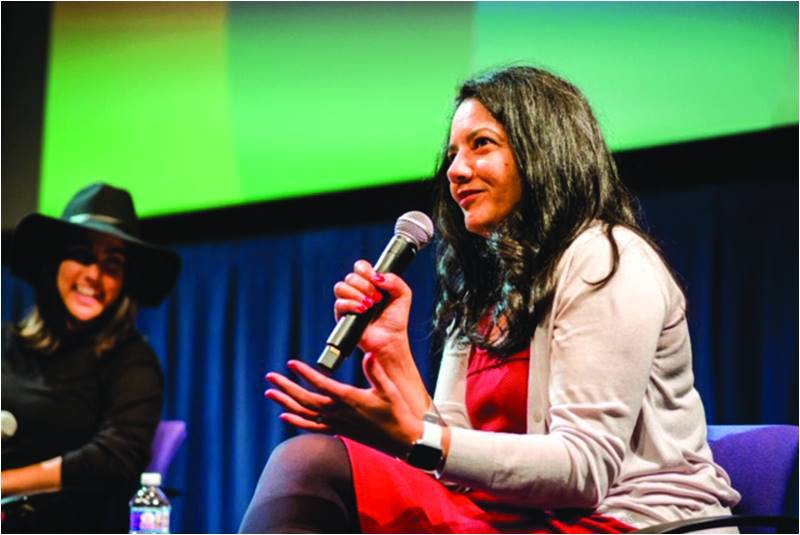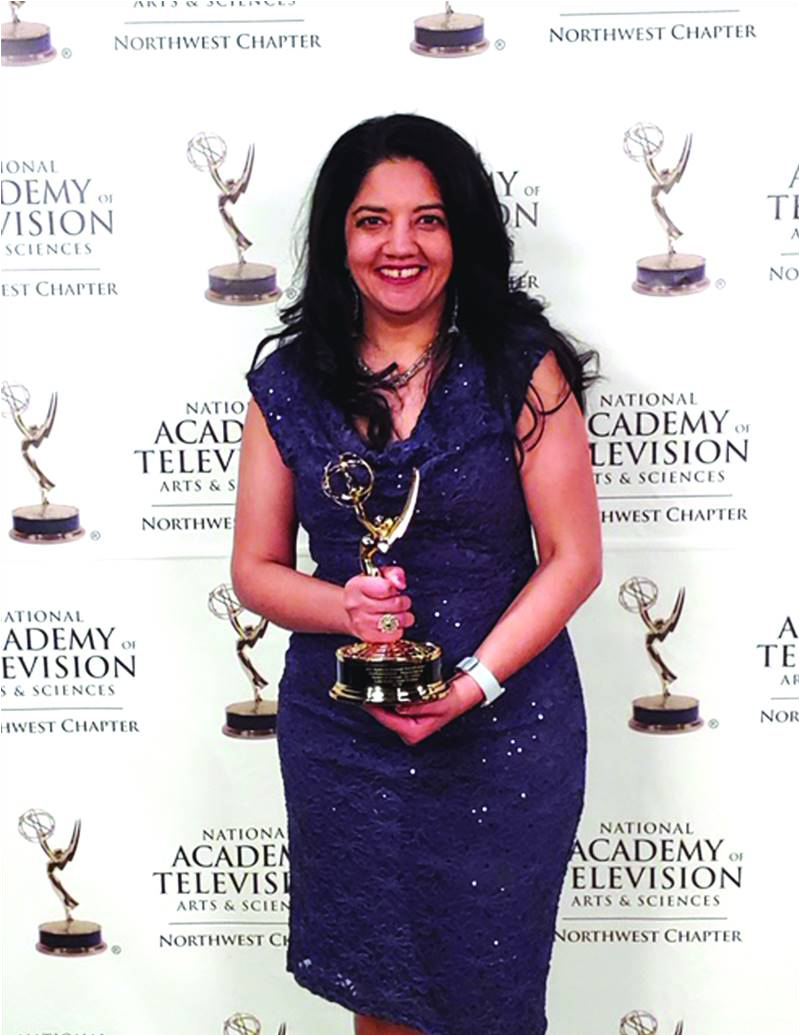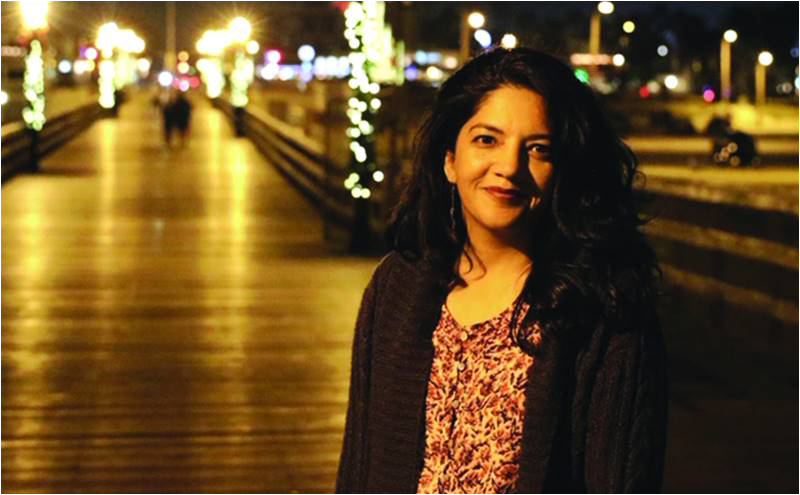
What happens when you combine a love of story-telling with production proficiency? You find a power house of talent called Laila Kazmi.
Laila is a Pakistani American producer based in Seattle. She’s received the Northwest Emmy Award twice and has been nominated six times, the latest nomination being this year.
Laila is the only Pakistani-American producer/director to have received an award in the Northwest Emmys.
Her documentary shorts have aired on PBS television stations in Seattle, San Diego, Boston and streamed on PBS NewsHour.
Born in Karachi, Laila moved with her family to the U.S in the 1980s.

After fifteen years in Chicago, Laila moved to Seattle where she now lives with her husband and three children.
On a rare sunlit Seattle day, Laila and I talk about a love of storytelling, the power of documentary and a time of diversity. Here’s what a vibrant woman with sensitive vision has achieved...
Zeinab Masud: You’re a succesful producer and director. How did this journey begin?
Laila Kazmi: Growing up I never though I would make films. I actually began story telling by writing. I did a writing program at the University of Washington, then when my kids were very young and I was at home with them, I did a lot of free-lance writing. During that time I went back to graduate school and was exposed to video. I have always loved films. After graduate school I ended up getting a job at the PBS station in Seattle, creating content for the web. I started there and then moved into television production.
ZM: You’ve won awards for your work, tell us about that.
LK: The first Emmy was for a show that I was a part of. There were multiple producers. I had a story there about a music therapist working with children going through cancer treatment. Sometimes you end up doing work that makes you a better person and you end up learning about life. That was one of those stories, it was about how music therapists were helping these children.
The second one was last year, it was a story about four Latino artistes from the North-west, it was called Los Artistas

ZM: And there was something that was nominated recently?
LK: I learnt about a program at a theatre here in Seattle, doing improvisational acting classes for people going through early stages of memory loss, dementia. I thought it was intriguing and decided to do a documentary about it. That’s the one recently nominated.
ZM: The topics you’ve dealt with pull at the heart strings. Does the frailty of a situation attract you? What makes you want to tell a story?
LK: I like to tell stories that haven’t been seen on television often.
There are heroes among us every where. Everyday heroes.
And we don’t always see them on television.
I tell stories to offer new perspectives and insights. We all want to do good in this world and my way of doing so is through storytelling. I am drawn to stories that bring people together.
In America, we are people from all over the world living together, in theory with equal rights. Growing up my father always said, ‘remember, in general people are good.’ And I firmly believe that. Racism and discrimination are often rooted in a fear of the unknown. By telling stories of people of diverse heritage and experiences, I hope to mitigate some of that fear and bridge some gaps. Whether Irish, Italian, Latino, Pakistani, or of any other heritage, as Americans we can find so many commonalities in our experiences.
ZM: So as a Pakistani-American, you have been drawn to telling stories about cultural dynamics, the type faced by immigrants who have moved here?
LK: The series I launched at the Seattle PBS channel, they were all immigrant stories, ‘Borders and Heritage.’
One of my favorite stories has been about Humaira Abid, a Pakistani sculptor living in Seattle.
ZM: Would it have been easier for you had you not been a woman of colour?
LK: There are a lot of challenges but also a lot of people who are there to support you and help you succeed. If you are non white, you do have to speak louder and work harder. While producing Los Artistas, there were definitely challenges But the team I worked with were very supportive. I’ve learnt a lot from them.
ZM: You started as a writer?
LK: In 2002 I launched a website called Jazba, I was working in IT and I had come across a journalist called Razia Bhatti. I was curious and wanted to know more about her. I wondered why people were not writing about people from that part of the world. I thought that’s something I would want to do. So I launched this website concentrating on women from Pakistan. There were interviews with Yasmin Lari and Salima Hashmi amongst others. It was a total labour of love. That was my start in print story telling. Working in television started in 2011.
ZM: Has the shift in politics over the past few years made it more difficult?
LK: Political divisiveness has created more voices. There are more people wanting to tell their stories. People like me, African Americans, Latinas have all realized that you have to speak up.
Challenges are still there but there are more stories now and more people producing those stories. There’s a quote by Mira Nair which I love...“nothing more powerful than seeing your own colors, your own people and your own dramas on screen”
I love that and I’ve lived it!
ZM: Who inspires you in film?
LK: I appreciate the works of documentary filmmakers like Errol Morris, and more recently Ava DuVerney and Morgan Neville - his film ‘20 Feet from Stardom’ is one my favourite documentaries. I have a lot of respect for Sharmeen Obaid Chinoy and her dedication and tenacity in taking on bold subjects and making us face difficult truths. She is telling the stories that need to be told. I must add that although I’ve worked primarily in short documentaries, I absolutely love cinema, i.e. the craft of narrative storytelling. I am mostly inspired by Eastern cinema, in particularly Iranian cinema. I love the realism of Jafar Panahi’s films and the romanticism of Abbas Kiarostami. Additionally, Mira Nair has long been an inspiration: I love the variety of her work. Among recent directors, I love Zoya Akhtar’s films and I thoroughly enjoyed Haifa al Mansoor’s film ‘Wadjda’ - to see an excellent film by the first Saudi female director was so powerful.
ZM: So what’s next for Laila Kazmi?
LK: Well, I’ve launched my own production company, Kazbar media. I’m still doing work in television and am going to continue making films. My most recent project was a music video, a cross between documentary and narrative. At present I’m primarily working on a couple of documentary ideas.
Laila is a Pakistani American producer based in Seattle. She’s received the Northwest Emmy Award twice and has been nominated six times, the latest nomination being this year.
Laila is the only Pakistani-American producer/director to have received an award in the Northwest Emmys.
Her documentary shorts have aired on PBS television stations in Seattle, San Diego, Boston and streamed on PBS NewsHour.
Born in Karachi, Laila moved with her family to the U.S in the 1980s.

After fifteen years in Chicago, Laila moved to Seattle where she now lives with her husband and three children.
On a rare sunlit Seattle day, Laila and I talk about a love of storytelling, the power of documentary and a time of diversity. Here’s what a vibrant woman with sensitive vision has achieved...
***
Zeinab Masud: You’re a succesful producer and director. How did this journey begin?
Laila Kazmi: Growing up I never though I would make films. I actually began story telling by writing. I did a writing program at the University of Washington, then when my kids were very young and I was at home with them, I did a lot of free-lance writing. During that time I went back to graduate school and was exposed to video. I have always loved films. After graduate school I ended up getting a job at the PBS station in Seattle, creating content for the web. I started there and then moved into television production.
ZM: You’ve won awards for your work, tell us about that.
LK: The first Emmy was for a show that I was a part of. There were multiple producers. I had a story there about a music therapist working with children going through cancer treatment. Sometimes you end up doing work that makes you a better person and you end up learning about life. That was one of those stories, it was about how music therapists were helping these children.
The second one was last year, it was a story about four Latino artistes from the North-west, it was called Los Artistas

ZM: And there was something that was nominated recently?
LK: I learnt about a program at a theatre here in Seattle, doing improvisational acting classes for people going through early stages of memory loss, dementia. I thought it was intriguing and decided to do a documentary about it. That’s the one recently nominated.
ZM: The topics you’ve dealt with pull at the heart strings. Does the frailty of a situation attract you? What makes you want to tell a story?
LK: I like to tell stories that haven’t been seen on television often.
There are heroes among us every where. Everyday heroes.
And we don’t always see them on television.
I tell stories to offer new perspectives and insights. We all want to do good in this world and my way of doing so is through storytelling. I am drawn to stories that bring people together.
In America, we are people from all over the world living together, in theory with equal rights. Growing up my father always said, ‘remember, in general people are good.’ And I firmly believe that. Racism and discrimination are often rooted in a fear of the unknown. By telling stories of people of diverse heritage and experiences, I hope to mitigate some of that fear and bridge some gaps. Whether Irish, Italian, Latino, Pakistani, or of any other heritage, as Americans we can find so many commonalities in our experiences.
ZM: So as a Pakistani-American, you have been drawn to telling stories about cultural dynamics, the type faced by immigrants who have moved here?
LK: The series I launched at the Seattle PBS channel, they were all immigrant stories, ‘Borders and Heritage.’
One of my favorite stories has been about Humaira Abid, a Pakistani sculptor living in Seattle.
ZM: Would it have been easier for you had you not been a woman of colour?
LK: There are a lot of challenges but also a lot of people who are there to support you and help you succeed. If you are non white, you do have to speak louder and work harder. While producing Los Artistas, there were definitely challenges But the team I worked with were very supportive. I’ve learnt a lot from them.
ZM: You started as a writer?
LK: In 2002 I launched a website called Jazba, I was working in IT and I had come across a journalist called Razia Bhatti. I was curious and wanted to know more about her. I wondered why people were not writing about people from that part of the world. I thought that’s something I would want to do. So I launched this website concentrating on women from Pakistan. There were interviews with Yasmin Lari and Salima Hashmi amongst others. It was a total labour of love. That was my start in print story telling. Working in television started in 2011.
ZM: Has the shift in politics over the past few years made it more difficult?
LK: Political divisiveness has created more voices. There are more people wanting to tell their stories. People like me, African Americans, Latinas have all realized that you have to speak up.
Challenges are still there but there are more stories now and more people producing those stories. There’s a quote by Mira Nair which I love...“nothing more powerful than seeing your own colors, your own people and your own dramas on screen”
I love that and I’ve lived it!
ZM: Who inspires you in film?
LK: I appreciate the works of documentary filmmakers like Errol Morris, and more recently Ava DuVerney and Morgan Neville - his film ‘20 Feet from Stardom’ is one my favourite documentaries. I have a lot of respect for Sharmeen Obaid Chinoy and her dedication and tenacity in taking on bold subjects and making us face difficult truths. She is telling the stories that need to be told. I must add that although I’ve worked primarily in short documentaries, I absolutely love cinema, i.e. the craft of narrative storytelling. I am mostly inspired by Eastern cinema, in particularly Iranian cinema. I love the realism of Jafar Panahi’s films and the romanticism of Abbas Kiarostami. Additionally, Mira Nair has long been an inspiration: I love the variety of her work. Among recent directors, I love Zoya Akhtar’s films and I thoroughly enjoyed Haifa al Mansoor’s film ‘Wadjda’ - to see an excellent film by the first Saudi female director was so powerful.
ZM: So what’s next for Laila Kazmi?
LK: Well, I’ve launched my own production company, Kazbar media. I’m still doing work in television and am going to continue making films. My most recent project was a music video, a cross between documentary and narrative. At present I’m primarily working on a couple of documentary ideas.

